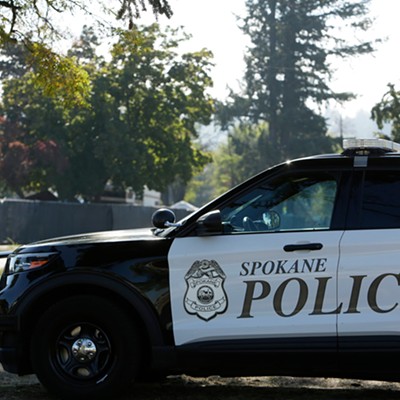A Vote for Balance
[
{
"name": "Broadstreet - Instory",
"insertPoint": "5",
"component": "25846487",
"requiredCountToDisplay": "5"
},{
"name": "Broadstreet - Instory",
"insertPoint": "10",
"component": "25846487",
"requiredCountToDisplay": "10"
},{
"name": "Broadstreet - Instory",
"insertPoint": "15",
"component": "25846487",
"requiredCountToDisplay": "15"
},{
"name": "Broadstreet - Instory",
"insertPoint": "20",
"component": "25846487",
"requiredCountToDisplay": "20"
}
]
by The Inlander & r & & r &
Spokane County Commissioner
Bonnie Mager
With Jim West's passing, Phil Harris has become the Goliath of local politics. He has 12 years behind him and perhaps thousands of people who have been touched by his folksy charm. Say what you will about Harris, but he is a natural at that old-school style of personal politics -- he takes on the tiniest problem, writes it down in his little black book and tries to deliver a solution. And don't underestimate the power of smooth streets in Spokane County. This is why he is so formidable an incumbent to unseat; Democrats needed to field the best candidate possible to beat him.
Bonnie Mager may not be that person, but she's passionate... about one issue: land use. It is one of the biggest issues, but will it prove big enough to beat Harris?
Mager's critique of Spokane County government is valid: Do the county commissioners represent the people's needs or the desires of developers? The perception, at least, is that they work for developers. Mager's best chance is if voters decide to add balance to the Board of Commissioners -- something they passed on last time around, when they chose two pro-growth Republicans -- Mark Richard and Todd Mielke -- to join Harris, also a Republican.
Perceptions are rooted in reality, and the commissioners suffer from trying to run a 21st century organization with a 19th century tool -- like trying to fix your laptop with a wheat thresher. (Why were we not surprised when the City of Spokane Valley decided to strike out on its own?)
Harris recognizes the limitations in the system, but he has had 12 years to offer a solution. Step one is to add two more commissioners -- at the moment, any time two of them meet in the hall and broach a public issue, they're a quorum and it's a public meeting. While other counties have figured out ways to join the modern era, Spokane County continues to ride in the governmental equivalent of the horse and buggy. Mielke, Richard and whoever wins this race need to focus on this reform -- three commissioners is just not working.
In the meantime, the board needs better balance -- as it had when Kate McCaslin and John Roskelley served with Harris. Mager will be faced with a lot more than questions on land use if she wins, but she would create better representation. She will also need to prepare herself not to meet the fate of so many critics when they finally take the reins of government and discover that running the operation is much, much harder than criticizing it.
Harris has had a surprisingly long tenure; to many people, Harris is Spokane County. But it's time for Spokane County to change.
Spokane County
Proposition One
Purchasing land for light-rail lines
Yes
Spokane County
Proposition Two
Creating a funding proposal for light rail
4 Yes
This is no way to build a railroad. Whenever Spokane needs to make a big decision, there's a campaign to inform the public. Creating the new city of Spokane Valley? Several tries, big campaigns. The strong mayor system in Spokane? Big campaign. The new convention center? The Arena? Yep, big campaigns.
So it's beyond puzzling to see so big a local initiative get treated so lightly. There is a committee, and perhaps we shouldn't blame them -- after all, they are doing something. Maybe it's the Spokane Transit Authority -- shouldn't they be allowed to push public information? Or maybe the people who are currently behind the effort want to make it as confusing as possible (two wordy measures) so it will fail? It's hard not to think that way, but let's hope that's not the case. Whatever the reason, the way light rail is being promoted doesn't inspire a lot of confidence.
So don't be surprised if this orphaned issue fails for lack of understanding: When voters don't get something or haven't heard enough about it, they vote no. That would be extremely sad for the region, because unlike the Arena or city of Spokane Valley, there may not be another chance. Some backers are saying this is it; now is your final chance to create a light rail line here.
This is exactly how Spokane in the '90s operated: clutching failure from the jaws of progress. Things have changed, however, and Spokane is not quite so afraid to try something new. And all these two measures would do is allow the purchase of more rights-of-way (with some surplus STA funds) before they get more expensive and create a firm proposal to be voted on, perhaps in 2008.
Light rail is exactly the kind of project local government should be taking on. Transportation infrastructure is the best thing we can do to create economic development and control growth. And as the Spokane-Coeur d'Alene area continues to grow and prosper, having the line in place will allow expansion -- to North Idaho, the airport, to north Spokane.
Seattle has been kicking itself for decades for passing on the chance at light rail when it was still affordable in the 1960s; Portland is reaping the benefits of making the public investment, as it is routinely rated among the best places to live and has a very hot economy.
Those examples alone should be enough to prove that Spokane County should take the next step on the path to better transportation. n
The Inlander offers its opinion on many but not all elective races and ballot measures. This week is the last week we'll be making endorsements. Election Day is Tuesday, Nov. 7.
Previous
Endorsements
Idaho Proposition One:
Yes
Idaho Proposition Two:
No
Idaho Congress, 1st District:
Larry Grant
Washington Initiative 920:
No
Washington Initiative 933:
No
Washington Initiative 937:
No
Washington U.S. Senate:
Maria Cantwell
Washington Senate, 6th District:
Chris Marr
Spokane County Commissioner
Bonnie Mager
With Jim West's passing, Phil Harris has become the Goliath of local politics. He has 12 years behind him and perhaps thousands of people who have been touched by his folksy charm. Say what you will about Harris, but he is a natural at that old-school style of personal politics -- he takes on the tiniest problem, writes it down in his little black book and tries to deliver a solution. And don't underestimate the power of smooth streets in Spokane County. This is why he is so formidable an incumbent to unseat; Democrats needed to field the best candidate possible to beat him.
Bonnie Mager may not be that person, but she's passionate... about one issue: land use. It is one of the biggest issues, but will it prove big enough to beat Harris?
Mager's critique of Spokane County government is valid: Do the county commissioners represent the people's needs or the desires of developers? The perception, at least, is that they work for developers. Mager's best chance is if voters decide to add balance to the Board of Commissioners -- something they passed on last time around, when they chose two pro-growth Republicans -- Mark Richard and Todd Mielke -- to join Harris, also a Republican.
Perceptions are rooted in reality, and the commissioners suffer from trying to run a 21st century organization with a 19th century tool -- like trying to fix your laptop with a wheat thresher. (Why were we not surprised when the City of Spokane Valley decided to strike out on its own?)
Harris recognizes the limitations in the system, but he has had 12 years to offer a solution. Step one is to add two more commissioners -- at the moment, any time two of them meet in the hall and broach a public issue, they're a quorum and it's a public meeting. While other counties have figured out ways to join the modern era, Spokane County continues to ride in the governmental equivalent of the horse and buggy. Mielke, Richard and whoever wins this race need to focus on this reform -- three commissioners is just not working.
In the meantime, the board needs better balance -- as it had when Kate McCaslin and John Roskelley served with Harris. Mager will be faced with a lot more than questions on land use if she wins, but she would create better representation. She will also need to prepare herself not to meet the fate of so many critics when they finally take the reins of government and discover that running the operation is much, much harder than criticizing it.
Harris has had a surprisingly long tenure; to many people, Harris is Spokane County. But it's time for Spokane County to change.
Spokane County
Proposition One
Purchasing land for light-rail lines
Yes
Spokane County
Proposition Two
Creating a funding proposal for light rail
4 Yes
This is no way to build a railroad. Whenever Spokane needs to make a big decision, there's a campaign to inform the public. Creating the new city of Spokane Valley? Several tries, big campaigns. The strong mayor system in Spokane? Big campaign. The new convention center? The Arena? Yep, big campaigns.
So it's beyond puzzling to see so big a local initiative get treated so lightly. There is a committee, and perhaps we shouldn't blame them -- after all, they are doing something. Maybe it's the Spokane Transit Authority -- shouldn't they be allowed to push public information? Or maybe the people who are currently behind the effort want to make it as confusing as possible (two wordy measures) so it will fail? It's hard not to think that way, but let's hope that's not the case. Whatever the reason, the way light rail is being promoted doesn't inspire a lot of confidence.
So don't be surprised if this orphaned issue fails for lack of understanding: When voters don't get something or haven't heard enough about it, they vote no. That would be extremely sad for the region, because unlike the Arena or city of Spokane Valley, there may not be another chance. Some backers are saying this is it; now is your final chance to create a light rail line here.
This is exactly how Spokane in the '90s operated: clutching failure from the jaws of progress. Things have changed, however, and Spokane is not quite so afraid to try something new. And all these two measures would do is allow the purchase of more rights-of-way (with some surplus STA funds) before they get more expensive and create a firm proposal to be voted on, perhaps in 2008.
Light rail is exactly the kind of project local government should be taking on. Transportation infrastructure is the best thing we can do to create economic development and control growth. And as the Spokane-Coeur d'Alene area continues to grow and prosper, having the line in place will allow expansion -- to North Idaho, the airport, to north Spokane.
Seattle has been kicking itself for decades for passing on the chance at light rail when it was still affordable in the 1960s; Portland is reaping the benefits of making the public investment, as it is routinely rated among the best places to live and has a very hot economy.
Those examples alone should be enough to prove that Spokane County should take the next step on the path to better transportation. n
The Inlander offers its opinion on many but not all elective races and ballot measures. This week is the last week we'll be making endorsements. Election Day is Tuesday, Nov. 7.
Previous
Endorsements
Idaho Proposition One:
Yes
Idaho Proposition Two:
No
Idaho Congress, 1st District:
Larry Grant
Washington Initiative 920:
No
Washington Initiative 933:
No
Washington Initiative 937:
No
Washington U.S. Senate:
Maria Cantwell
Washington Senate, 6th District:
Chris Marr




















